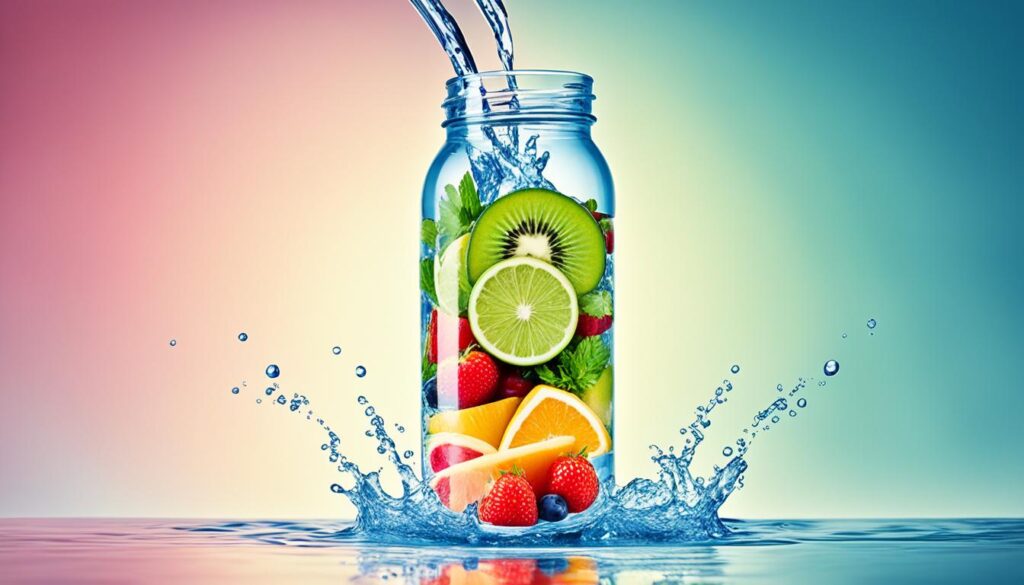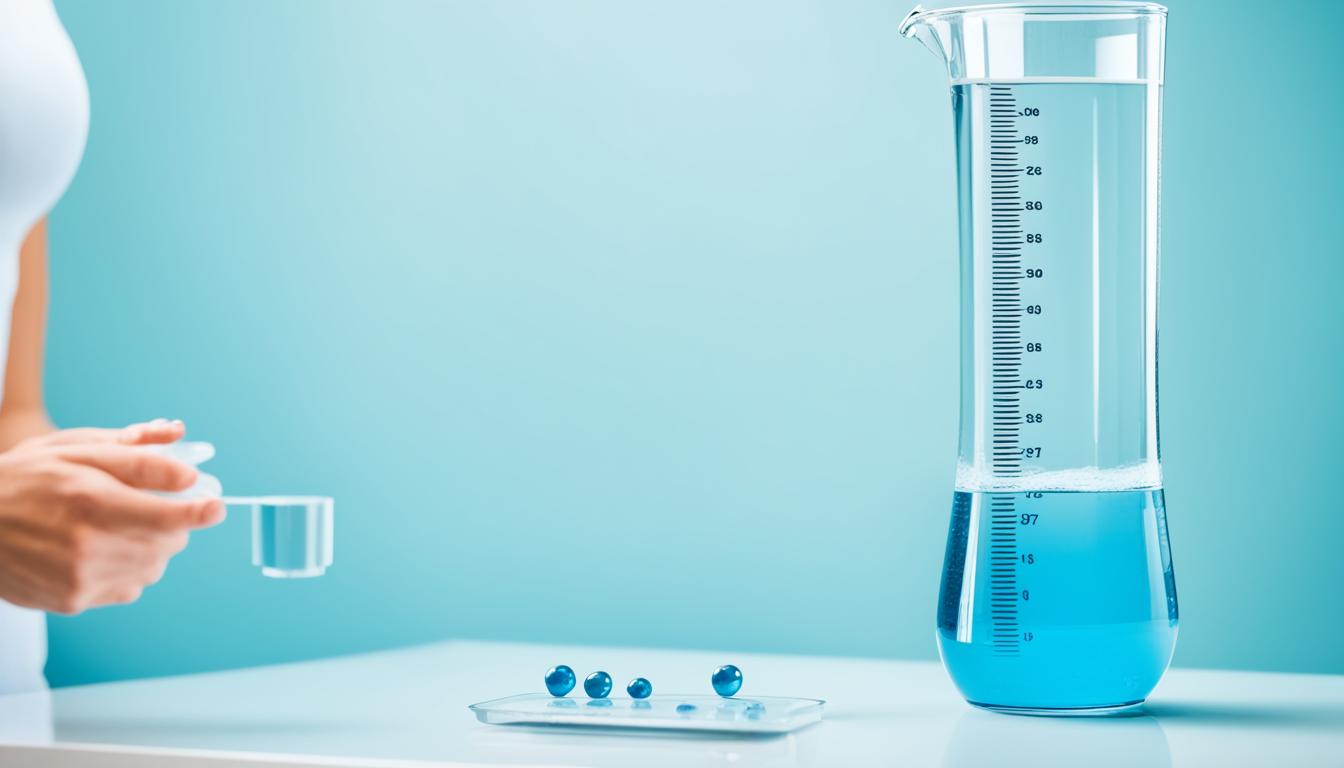Delving into the scientific connection between water and weight loss unveils a fascinating interplay between staying hydrated and shedding pounds. As modern research continues to unravel the pivotal role that hydration plays in maintaining optimal body function, a question emerges: Can staying hydrated to support weight loss really make a difference? This query ignites a closer examination of how our bodies, composed of about 60% water, utilize this essential fluid to potentially enhance metabolism, regulate appetite, and encourage efficient energy use—all foundational components in the narrative of weight management.
Through a lens of scientific scrutiny, experts are piecing together the puzzle of hydration’s part in weight control. The existing body of evidence infers a multifaceted relationship, wherein water consumption may align with decreased calorie intake and heightened metabolic efficiency. It’s not simply about drinking water; it’s about understanding the science behind water and weight loss, and harnessing this element to potentially tip the scales in favor of a healthier, more balanced physique.
Key Takeaways
- Hydrating the body may help regulate metabolic functions essential for weight loss.
- Scientific studies indicate water can act as a natural appetite suppressant, potentially leading to reduced calorie consumption.
- Colder water may initiate a process called thermogenesis, where the body burns calories to raise water temperature to body level.
- Replacing high-calorie drinks with water is a simple yet effective tactic for managing daily caloric intake.
- Staying well-hydrated is key for maintaining energy levels and workout effectiveness during weight loss efforts.
- Understanding the scientific connection between water and weight loss can serve as a leverage point for those aiming to lose weight comfortably and sustainably.
The Science Behind Water and Weight Loss
Understanding the intricate relationship between hydration benefits and weight loss requires an exploration into the fundamental roles water plays within the human body. This crucial element is not merely a thirst quencher; it’s a key player in various biological processes that support metabolic efficiency and energy management.
Within the domain of weight management, the benefits of staying hydrated for weight loss are increasingly advocated by health professionals. Delving deep into the mechanisms of how water and metabolism intertwine gives us valuable insights into the potential of water to aid in weight reduction.
Water’s Role in Bodily Functions and Metabolic Efficiency
As a major component of blood plasma, water facilitates the transport of nutrients and removal of waste, keeping the body’s cells in prime condition for metabolic activities. Adequate hydration is linked to improved organ function, including that of the liver and kidneys, both of which are instrumental in metabolism and detoxification processes essential for maintaining a healthy weight.
Appetite Suppression and Increased Metabolism Through Hydration
Hydration also appears to serve as a natural form of appetite suppression. By consuming water regularly, individuals may experience a sensation of fullness, reducing the urge to consume more calories than necessary. Moreover, some studies indicate that increasing water consumption can enhance metabolic rate, thereby contributing, albeit modestly, to caloric burn and weight loss efforts.
Energy Expenditure and Thermogenesis: The Role of Water Temperature
Drinking cold water could potentially lead to an increase in energy expenditure through a process known as thermogenesis, wherein the body works to warm the water to body temperature, utilizing calories in the process. While the impact on total daily energy expenditure may be marginal, it illustrates the multifaceted ways in which how water aids in weight loss.
| Hydration Effect | Bodily Function | Potential Weight Loss Benefit |
|---|---|---|
| Increase in Fluid Intake | Enhanced Nutrient Transportation | Optimal Cellular Function for Metabolism |
| Water-Induced Satiety | Reduction in Hunger Sensation | Fewer Calories Consumed |
| Cold Water Consumption | Initiation of Thermogenesis | Minor Caloric Expenditure Increase |
With these insights, we can appreciate the importance of hydration not just for overall health, but as an adjunct in weight loss strategies. A fully hydrated body operates more efficiently, may naturally curb appetite, and even produce slight metabolic advancements that contribute to the broader goal of weight reduction.
Hydration Benefits for Appetite Control
Embarking on a weight loss journey often includes a closer look at diet and exercise. Yet, an element that is sometimes overlooked is the impact of water intake for weight loss. It’s not simply about lowering calories; it’s about fundamental biological responses that can aid in managing hunger and facilitating weight control. Unpacking the complexities of drinking water for weight loss reveals how hydration could serve as a natural ally in appetite control and, thereby, weight management.
Mistaking Thirst for Hunger
It’s a common conundrum people face: the body signaling hunger when, in reality, it’s thirst that needs quenching. Misinterpreting these cues can lead to increased caloric intake when a glass of water might have sufficed. With hydration being crucial for numerous bodily functions, ensuring adequate water intake for weight loss becomes a strategic part of controlling appetite.
Water as a Natural Appetite Suppressant
Water’s power extends beyond mere thirst-quenching—it has the potential to act as a natural appetite suppressant. This relationship between hydration and appetite control manifests as water contributes to a feeling of satiety. By ingesting water, the stomach stretches, triggering signals to the brain that create a sensation of fullness, thus, potentially diminishing the urge to consume more.
Pre-Meal Water Consumption Effects on Food Intake
The timing of water consumption also plays a significant role in how effectively it can aid in appetite suppression. Studies show a link between drinking water before meals and a reduction in subsequent food intake. In a particular cohort, individuals who drank water before eating consumed up to 22% fewer calories than those who did not, providing a compelling case for water’s influence on calorie consumption.

- Drinking water can help prevent misjudging thirst for hunger, leading to reduced caloric intake.
- Regular water consumption may stretch the stomach, sending fullness signals to the brain and controlling the impulse to eat more.
- Consuming water before meals is associated with eating fewer calories during the meal.
Through the lens of science and research, we begin to appreciate the reciprocal relationship between hydration, appetite, and, ultimately, weight management. As such, integrating adequate water consumption into one’s daily routine stands as a simple, yet effective, approach to support weight loss and control appetite.
Water Intake for Weight Loss
Understanding the importance of water in losing weight is crucial for anyone looking to manage their weight effectively. Water is not just a vital component of our bodies but also plays a significant role in the process of weight loss. Through strategic changes in liquid consumption and an understanding of how water’s influence on lipolysis may contribute to fat burning, the act of drinking more water can be a simple yet powerful tool in your weight management arsenal.
Reducing Liquid Calorie Intake
One of the primary strategies for reducing calorie intake is to substitute high-calorie drinks with water. This switch has been shown to lead to substantial calorie savings over time. For example, replacing a single 20-ounce sugary soda with water can eliminate around 250 calories from your daily intake. Over time, such consistent caloric savings can significantly impact overall weight management and support weight loss goals.

Dietary Changes and Water’s Effect on Weight Management
Complementing dietary changes with increased water consumption could lead to more effective weight management. By adopting a hydration-forward diet, where water takes the place of other calorie-dense beverages, individuals may experience an easier time creating a calorie deficit, which is essential for weight loss. The regular intake of water supports a feeling of fullness, often resulting in a natural reduction in food consumption and thus aiding in the weight loss process.
Influence of Water on Lipolysis and Fat Oxidation
Lipolysis, the process by which fats are broken down in the body, is another area where water intake might play a role. While human studies are still needed to confirm findings from animal studies, there is evidence to suggest that how drinking more water can lead to weight loss includes potentially upping the body’s ability to burn fat. Research indicates that a well-hydrated body might have a more active lipolysis process compared to when dehydrated, hinting at the importance of ample water intake for those striving to lose weight.
- Switching from calorie-laden drinks to water can significantly cut daily caloric intake.
- Adequate water consumption may be a helpful ally in creating the necessary caloric deficit for weight loss.
- Increasing water intake might positively influence the body’s fat-burning capacity through enhanced lipolysis.
In conclusion, while there are many factors involved in weight management, the role of water should not be underestimated. From aiding in the reduction of liquid calories to potentially promoting increased fat oxidation, water proves to be a beneficial and accessible component of any weight loss regimen.
Importance of Water in Losing Weight Through Physical Activity
Integrating physical activity into a weight loss strategy is pivotal, but equally crucial is understanding the role of water in this equation. Dive into how the benefits of staying hydrated for weight loss are magnified during exercise and why your water bottle might be as important as your sneakers when you hit the gym. Those who stay vigilant about their hydration status can amplify the weight loss benefits stemming from their workouts, clearly illustrating why water aids in weight loss through a harmony of biological functions.
Electrolyte Balance and Muscle Function During Exercise
During vigorous workouts, the benefits of staying hydrated for weight loss become apparent through the maintenance of critical electrolyte balance. These charged minerals—such as sodium, potassium, and magnesium—are essential for muscle function, as they facilitate nerve impulses and muscle contractions. Water acts as the medium for these electrolytes, sustaining physical performance and stalling fatigue. Without adequate hydration, the electrolyte balance can be disrupted, leading to compromised muscle function and suboptimal workouts, thus impeding one’s journey toward weight loss.
Preventing Dehydration-Induced Muscle Breakdown
Another compelling reason to focus on staying hydrated to support weight loss lies in prevention of muscle breakdown. Exercise puts stress on muscle tissues, and without enough water, the body cannot efficiently repair and build muscle. Dehydration accelerates muscle protein breakdown, slowing down the gains from your training and potentially stalling weight loss progress. Prioritizing hydration can protect and nurture muscle integrity, allowing for consistent progression in workout intensity and duration—key factors in achieving weight loss goals.
Enhancing Workout Effectiveness with Proper Hydration
Looking beyond the scale, the benefits of staying hydrated for weight loss include enhanced workout effectiveness. Muscles aside, the body’s ability to regulate temperature through sweating hinges on hydration. This process not only prevents overheating but also extends the potential for more vigorous and prolonged exercise sessions. These sessions contribute to increased caloric expenditure, which is at the heart of weight loss. In essence, being well-hydrated ensures that your workouts are not only safer but also more productive, emphasizing the notion that water aids in weight loss by unlocking the full potential of your physical endeavors.




